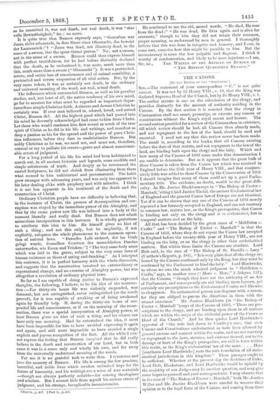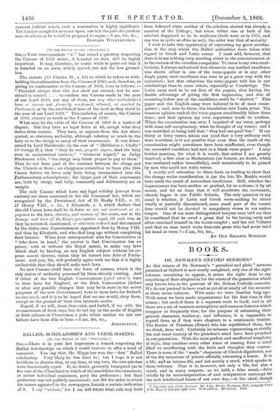and universal meaning of the word, not real, actual death.
Sin,—me statement of your correspondent " C." is not quite The influences which surrounded Bunsen, as well as his peculiar correct. It was not by 25 henry VIII., c. 19, that the King was studies, and, not least of all, the native tendency of his own mind, declared Supreme Head of the Church, but by 26 henry VIII., c. 1. go far to account for what must be regarded as important depar- The earlier statute is one on the submission of the clergy, and tures from simple Christian faith. A sincere and devout Christian he provides distinctly for the amount of authority residing in the certainly was. If ever man believed in, adored, loved, and served Canons. By the first section it is enacted that the clergy in Christ, Bunsen did. All the highest good which had pawed into Convocation shall not enact, promulge, or execute any canons or his mind he devoutly acknowledged bad come to him from Christ. constitutions without the King's royal assent and licence. The Let those who would condemn him first reveal as much of the true second section provided for a review of the Canons then in existence, spirit of Christ as he did in his life and writings, and manifest as till which review should be had, all Canons then already made, deep a passion as his for the spread and the power of pure Chris- and not repugnant to the law of the land, should be used and tian influences, before they dare to unchristianize Bunsen. But executed. I need not say that this review never has been made. nobly Christian as he was, we need not, and must not, therefore, The result is, according to the books, that all Canons existing conceal or try to palliate his errors—grave and almost unaccount- before the date of that statute, and not repugnant to the law of the able errors of judgment. land, are binding both upon the clergy and the laity. Which and For a long period of his life his mind had been habituated to how many of the Canons of 1603 come under that denomination I search out, in all ancient histories and legends, some credible and am unable to determine. But as it appears that the great bulk of simple substratum of trgth. And deeply as he reverenced the these Canons is taken from the Canon law which was received in sacred Scriptures, he did not shrink from eliminating from them England before the 25th year of Henry VIII., and that compare- what seemed to him unhistorical and preternatural. The habit tively little was added to these Canons by the Convocation of 1603 grew stronger with advancing years, and was only too apparent in I should imagine that many of them could set up a good Parlia- his later dealing alike with prophecy and with miracles. I think mentary title. The evidence, no doubt, would be the great diffi- it is not less apparent in his treatment of the death and the culty. As Mr. Justice Blackburn says in "The Bishop of Exeter v resurrection of Christ. Marshall," citing Chief Justice Tindal, the ancient Ecclesiastical law
Ordinary Christian people have no difficulty in believing that, of England and the general Canon law of Europe are not identical. in the instance of Christ, the process of decomposition and cor- Yet if it can be shown that any one of the Canons of 1603 merely ruption was stayed by the immediate power of the Almighty, and repeated a law formerly accepted in England, and one not contrary that by the same power new life was infused into a body at the to common law, statute law, or the King's prerogative, that Canon moment literally and really dead. But Bunsen does not admit is binding not only on the clergy and in re eeclesiasticii, but in miraculous interposition in this instance. It is wholly gratuitous temporal matters and on the laity. to attribute this idea to him. He himself gives no hint of All that has been decided by the great cases of "Middleton v. such a thing ; and not this only, but he implicitly, if not Crofts" and "The Bishop of Exeter v. Marshall" is that the explicitly, relegates the whole phenomena to the common opera- Canons of 1603, where they do not repeat the Canon law accepted tion of natural laws. " Derselbe Leib erstand, der ins Grab in England before the twenty-fifth year of Henry VIII., are not gelegt wurde, d enselben Gesetzen des menschlichen Daseins binding on the laity, or on the clergy in other than ecclesiastical unterworfen, wie Essen und Trinken :"$ "The very same body arose matters. But within these limits the Canons are absolute. Lord which was laid in the grave, subject to the very same laws of Holt said, in the case of "The Bishop of St. David's v. Lucy" human existence as those of eating and drinking." As I interpret (Carthew's Reports, p. 484), "It is very plain that all the clergy are this sentence, it is in perfect harmony with the whole discussion, bound by the Canons confirmed only by the King, but they must be and suggests that the resurrection involved no extraordinary or confirmed by the Parliament to bind the laity." Lord IIardwicke, supernatural change, and no exercise of Almighty power, but was to whom we owe the much admired judgment in "Middleton v.
altogether a revelation of ordinary physical laws. Crofts," says, in another case (" More v. More," 2 Atkyns, 157),
So far as I am capable of doing justice to Bunsen's expressed that the Canons, "though they have not the authority of an Act thoughts, the following, I believe, to be his idea of the resurrcc- of Parliament, and consequently are not binding upon laymen, yet tion :—For thirty-six hours life was violently suspended, was certainly are prescriptions to the Ecclesiastical Courts and likewise dormant, but not extinguished, never extinguished (as the result to clergymen. No ecclesiastical person can dispense with a canon, proved), for it was capable of awaking or of being awakened for they are obliged to pursue the directions in them with the again by friendly help. If, during the thirty-six hours of sus: utmost exactness." Mr. Justice Blackburn (in "the Bishop of pended life and consciousness, or if on the morning of the resin.- Exeter v. Marshall ") says of the Canons of 1603, "These are pre- rection, there was a special interposition of Almighty power, at scriptions to the clergy, and are binding upon them in all matters least Bunsen gives no hint of such a thing, and his silence can which are within the scope of the visitorial power of the Crown as have only one meaning. Had he entertained the idea, it must Head of the Church." And he then quotes Lord Hardwicke's have been impossible for him to have avoided expressing it again approval of "the rule laid down in Caudrey's case, that such and again, and still more impossible to have avoided a single Canons and Constitutions ecclesiastical as have been allowed by explicit and joyous recognition of the fact. All the while I can- general custom and consent within the realm, and are not contrary not repress the feeling that Bunsen iniagined that he did really or repugnant to the laws, statutes, and customs thereof, nor to the believe in the death and resurrection of our Lord, but in both damage or hurt of the King's prerogative, are still in force within cases it was in a sense only and wholly his own, and far away this realm, as the King's ecclesiastical law of the same. . . . Here For Inc it is no grateful task to write thus. I reverence and siastical jurisdiction in this kingdom." These passages ought to love the memory of Bunsen. His life is among the few precious, be sufficient. Whether at the present day the doctrines of Coke, beautiful, and noble lives which awaken unlimited hope for the Lord Holt, Blackstone, and Lord Hardwicke would be upheld by future of humanity, and his writings are a mine of rare materials the majority of our Judges may be another question, and may give —though not always perfectly reliable—for coming theologians some hopes to yourself and your correspondents. I may observe that and scholars. But I cannot hide from myself his serious errors of in the case of "The Bishop of Exeter v. Marshall," both Mr. Justice
eminent judicial minds, such a reservation is highly significant. Yet it is not enough for us to act upon, nor is it the part of a prudent man to advise as he would be prepared to argue.—I am, Sir, &c.,
EDWARD WILBERFORCE.



































 Previous page
Previous page